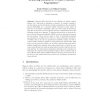Free Online Productivity Tools
i2Speak
i2Symbol
i2OCR
iTex2Img
iWeb2Print
iWeb2Shot
i2Type
iPdf2Split
iPdf2Merge
i2Bopomofo
i2Arabic
i2Style
i2Image
i2PDF
iLatex2Rtf
Sci2ools
113
Voted
FC
2005
Springer
2005
Springer
Achieving Fairness in Private Contract Negotiation
Abstract. Suppose Alice and Bob are two entities (e.g. agents, organizations, etc.) that wish to negotiate a contract. A contract consists of several clauses, and each party has certain constraints on the acceptability and desirability (i.e., a private “utility” function) of each clause. If Bob were to reveal his constraints to Alice in order to find an agreement, then she would learn an unacceptable amount of information about his business operations or strategy. To alleviate this problem we propose the use of Secure Function Evaluation (SFE) to find an agreement between the two parties. There are two parts to this: i) determining whether an agreement is possible (if not then no other information should be revealed), and ii) in case an agreement is possible, coming up with a contract that is valid (acceptable to both parties), fair (when many valid and good outcomes are possible one of them is selected randomly with a uniform distribution, without either party being able to cont...
| Added | 27 Jun 2010 |
| Updated | 27 Jun 2010 |
| Type | Conference |
| Year | 2005 |
| Where | FC |
| Authors | Keith B. Frikken, Mikhail J. Atallah |
Comments (0)

